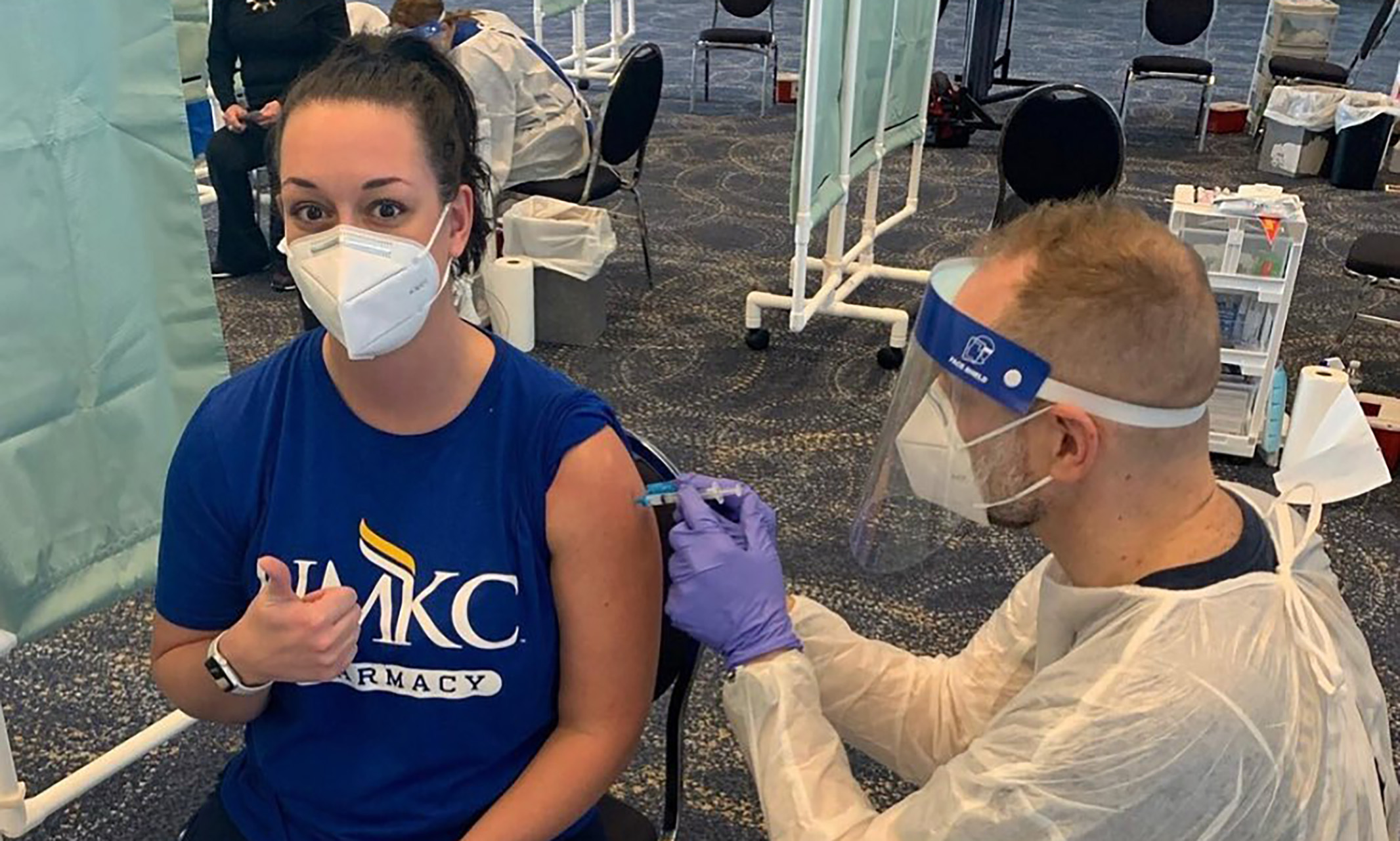As soon as the announcements came last November that vaccines for the COVID-19 virus would soon be released for distribution, Cameron Lindsey’s phone began ringing at the UMKC School of Pharmacy.
Lindsey, Pharm.D., MPH, interim chair of the division of pharmacy practice and administration, leads the schools’ vaccine response team. It is a group of faculty members at the school’s three campuses in Kansas City, Columbia and Springfield that was quickly assembled to provide manpower and other support for partners and outside entities launching or managing vaccine clinics across the state.
“I have people going to Clinton. I’ve got people going to Cape Girardeau, some I have going to St. Louis,” Lindsey said. “So, it is all over the state.”
UMKC pharmacy students also have done month-long rotations at the Hannibal Free Clinic since the COVID pandemic began.
By March, Lindsey said students and faculty from across the school’s three campuses had spent nearly 4,400 hours administering more than 17,500 doses of vaccines at 36 sites throughout the state in communities large and small.
Those were just the volunteer numbers reported by students and faculty. That doesn’t include the unreported number of students engaged in vaccine efforts as part of their clinical rotations or part-time jobs outside the classroom.
Vaccines are being administered at health systems, long-term care facilities, pharmacies, clinics and mass vaccine events at sites across the state. Since the inception of the first COVID vaccine in December, it’s been all hands on deck for students, faculty and staff of the School of Pharmacy and the other UMKC health sciences schools – Medicine, Dentistry and Nursing and Health Studies -- which have all been working overtime to help with the mass vaccine efforts.
As clinics quickly ramped up in March, filling the need for all of the requested help has been a challenge. Paul Gubbins, associate dean of the school’s Missouri State University campus, said he received a request from a site in Webster County near Springfield that has been typical of the need in rural communities. In short, “we just received a vaccine shipment and need any help your students can provide.”
“We've had several requests from community pharmacies that have had a pretty short lead time and some have been unable to predict when their next clinic will be,” he said. “We do the best we can to notify our students to assist. The demand is there and it's so high that the challenge is matching the resources to that demand because of the quick turnaround or the uncertainty in terms of the allocations that pharmacies get.”
UMKC Pharmacy students are trained and certified to give injections near the end of their second year of school. It’s become commonplace for the recently certified second-year and third-year pharmacy students to play an active role in vaccination events. More so, now with the COVID vaccines.
Roger Sommi, Pharm.D., associate dean of the school’s Columbia campus, said his students working with some of the area’s major pharmacies have reported sites administering as many as 300 to 350 COVID shots a day.
“There are a lot of opportunities (to help) and it’s fast and furious for sure,” Sommi said.
One student he spoke of was going back and forth between school and volunteering at a local pharmacy during her breaks between classes.
“She would go down to the pharmacy for two hours, inject 40 or 50 people and then come back to class,” Sommi said. “All of these places are taking everybody they can get.”
So great is the need for help that many of the pharmacy school’s faculty have gone through certification training on their own time to join the vaccination efforts. Sommi was one of five faculty members to go through one particular certification class that Lindsey taught.
“When I went through pharmacy school in the 1980s, injection certifications weren’t even a thing,” Sommi said. “With COVID, I saw a need and saw an opportunity to give back to the community, so I personally went through the certification process and there were least two others in my certification class in the same boat. I didn’t get it when I went to school. I didn’t need it for my practice, but I want to be part of the solution.”
The pleas for help are coming from across the state, particularly smaller communities where pharmacies and pop-up clinics are particularly short-staffed.
“Small towns are calling saying hey, we’re getting a shipment of Pfizer and we’re going to do (a vaccine clinic), do you have anybody that can help,” Sommi said. “The reality is, the students are tapped out. We just don’t have the number of students needed to meet the demand.”
In Springfield, Gubbins said a large number of his students have been busy administering vaccines through their workplace.
“Many of them work at large health care facilities or have pharmacies in their workplace that are offering a clinic where they get scheduled to work or volunteer to help,” Gubbins said. “In addition to volunteering, I think a large percent of the vaccination efforts our students engage in occur through their workplace.
“I've been putting out emails saying to students that if you have free time during the school week when you're not in class or going your clinic, here are the places that need help. Or, they're doing it when they're working. It's important to know that we really do fill that community resource by being here either in a volunteer or workforce sort of way.”

